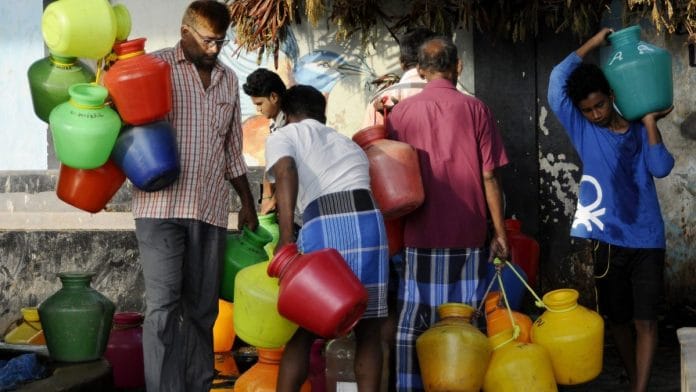Water has finally risen to the top of the Indian government’s priority list — as I write this, Prime Minister Narendra Modi has devoted an entire episode of his monthly radio broadcast Mann Ki Baat to the issue.
Putting his bully pulpit to good use, Modi has called for a mass movement — like Swachh Bharat — to save water. Since the new government took office, it has created a water ministry by folding up two older ones, set itself a goal of delivering piped water to all households by 2024, created a water management index that ranks states and is set to roll out a whole host of measures to conserve water. The government machinery will certainly move now that Modi has put his weight behind it.
For the rest of the country to move, though, platitudes have to be accompanied with incentives. The stark fact is that, by and large, there are few incentives for people to save water. There are few incentives for urban water utilities — who might lose 40 per cent of the water along the way— to become more efficient. There are few incentives for public investment in water supply. Needless to say, other than at the premium segment and in the unregulated tanker racket, no private investor will get anywhere close to the water supply business. That incentive is called price.
Also read: Modi govt’s Swachh Bharat shows why switching to ‘mission mode’ is helping India
Contrary to popular belief and experience, we are not running out of water — 71 per cent of the earth’s surface is covered by water. Despite the vagaries of the monsoon, India is not starved of rain. The problem does not lie in nature, but in the fact that Indian society is unable to cooperate in a manner that ensures each one of us has adequate water. The scary headline should not, therefore, read “Bengaluru will run out of water by 2020” but that “Karnataka is unable to work out how to supply water to Bengaluru”. The framing matters. Unless we recognise that the water problem is a social problem, we will waste time, money and emotions on the wrong solutions.
If a commodity is under-priced, it will be overused. Sell petrol for Rs 10 per litre tomorrow and there will be a lot more vehicles on the road. It is no different with water.
If you are among the fortunate ones to receive piped water from Bengaluru’s water supply board, you’d be paying between Rs 7 to Rs 45 per 1,000 litres. It costs the board at least Rs 82 per 1000 litres to merely distribute the water, because the water itself — from the river Cauvery — is not priced. How much does a litre of water taken out of a river or from a borewell cost? It’s the same as that of a litre of water from a desalination plant, which is around Rs 50 per 1000 litres in Tamil Nadu. So piped water in Bengaluru ought to cost over Rs 150 per 1,000 litres. Meanwhile, water supplied through private tankers costs around Rs 150 per 1,000 litres, which is extracted from the ground by the tanker operator, who doesn’t pay anyone for it. If water prices have no relation to its underlying scarcity, then there is no fundamental incentive for anyone to save it. The water supply board runs at a loss and has no incentive to be efficient. The consumer receives massively subsidised water and has little incentive to conserve it.
If the efforts of the government to get people to conserve are to bear fruit, water must be priced. For sustainability, water prices must approach the marginal cost of production and distribution.
Also read: India is behind in the water wars with China & Pakistan, it must get its act together
But what about the poor? How will they be able to afford water if it is so ‘expensive’. The fact is that currently, the urban poor may already be paying disproportionately more for the water they use. Households without piped connections do not receive water subsidies, and have to pay 20 times as much as a middle-class household on a per litre basis. There are numerous ways to address water access for the poor: from vouchers, to cash transfers, to larger toll-free quotas and free community taps. The point is that the rest of us have to pay the fair price of water.
The same principle must apply in rural areas as well, including for agriculture. This does not mean that all farmers must be charged for all the water they use, but that some form of a price-based mechanism must be introduced over time. For instance, my Takshashila colleagues have proposed a model where a price mechanism can operate at the level of state governments, who can either consume water or compensate farmers for not using it.
Also read: Not water, Chennai has a governance crisis. This ex-IAS officer has the solution
If we begin to price water to reflect its scarcity, cost of production and distribution, more supply will come online. There will be greater investments in R&D in water technology, in desalination plants, in rainwater harvesting, sewage treatment and a myriad other forms of conservation. If you can save or make money by collecting rainwater, you don’t need platitudes that tell you to do it.
The biggest enemy of water conservation is the concept that it is and must remain free of cost. If we cannot tackle that beast by the horns, yes, we will run out of water.
Nitin Pai is director of the Takshashila Institution, an independent centre for research and education in public policy. He is also on the board of Jal Seva Charitable Foundation. Views are personal.







The World Bank ha s also,been WRONGLY,demanding PRICING of water and also PRIVATIZE the supply. Double Whanny for Indians.Please google:-
IMF Riot
socialist kejriwal will die if free water is stopped